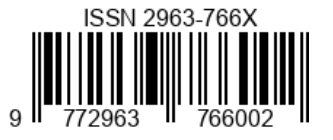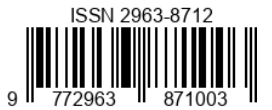Analisis Gaya Kepemimpinan dalam Peningkatan Kinerja Organisasi IPNU IPPNU Desa Kedungboto
DOI:
https://doi.org/10.55606/jupiman.v3i1.3279Keywords:
Leadership, Leadership Style, Organizational ParticipationAbstract
Leadership style analysis involves an in-depth understanding of how a leader leads and influences team or organization members. The purpose of this study is to evaluate the leadership style in improving the performance of the IPNU IPPNU organization in Kedung Boto Village. A qualitative approach was used as the research method, and a qualitative descriptive research type involves information in the form of words both written and oral from the observed subjects. The data collection process was conducted through interviews, observation, and documentation. The results showed that the IPNU-IPPNU organization in Kedung Boto Village applies a democratic leadership style. The strategy applied to increase organizational participation involves a systematic approach such as the formulation of work programs, implementation of work programs, and evaluation related to the program. Supporting factors include open and clear communication, inspirational leadership, member empowerment, shared goal setting, and an organizational culture that encourages participation. In contrast, inhibiting factors involve organizational characteristics, the environment, the level of activeness and discipline of organizational members, and suboptimal policies or practices in the field.
Downloads
References
Abijaya, S., Wildanu, E., & Jamaludin, A. (2021). Peranan Kepemimpinan dalam Organisasi (Studi Kasus Peran Pimpinan dalam Menjaga Soliditas Karyawan di PT. Nippon Indosari Corpindo). Jurnal Soshum Insentif, 4(1), 17–26. https://jurnal.lldikti4.or.id/index.php/jurnalsoshum/article/view/442/156
Al-Sakinah, P. S., Sudiro, A., & Faculty of Economics and Business, Universitas Brawijaya, F. of E. and B. U. B. (2020). the Influence of Spiritual Leadership on Lecturer’S Performance With the Mediation of Organizational Commitment and Work Motivation. Jurnal Aplikasi Manajemen, 18(2), 232–240. https://doi.org/10.21776/ub.jam.2020.018.02.03
Anwar, C., Istiatin, & Sudarwati. (2021). Leadership Role to Improvee Employee Perormance. Business and Accounting Research (IJEBAR) Peer Reviewed-International Journal, 5(3), 1–11.
Az-Zumaro, Lutfil Kirom. The Ultimate Personality. Yogyakarta: Safirah. 2015.
Bahrum, Syazhashah Putra. “Pengaruh Kepemimpinan dan Motivasi Kerja Terhadap Kinerja Pegawai (Studi Pada Pegawai Lembaga Dewan Kawasan Perdagangan Bebas Pelabuhan Bebas Batam Bintan Karimun)”. Jurnal Akuntansi, Ekonomi dan Manajemen Bisnis. 2. Oktober-November 2015.
Dewi, K. S. 2013. Pengaruh Gaya Kepemimpinan Transformasional terhadap Kepuasan Kerja Karyawan dan Komitmen Organisasi pada PT.KPM. Jurnal Manajemen, Strategi Bisnis, dan Kewirausahaan, 7 (2), 116-125.
Den Hartog, D. N. (2015). Ethical Leadership. Annual Review of Organizational Psychology and Organizational Behavior, 2, 409–434. https://doi.org/10.1146/annurev-orgpsych-032414-111237
Didin Kurniadin dan Imam Machali, Manajemen Pendidikan: Konsep dan Prinsip Pengelolaan Pendidikan, 288
Duha, T. (2018). Perilaku organisasi. Yogyakarta: Deepublish
Evi Zahara. (2018). Peranan Komunikasi Organisasi Pimpinan Organisasi. Peranan Komunikasi Organisasi Bagi Pimpinan Organisasi, 1829–7463(April), 8.
Gandolfi, F., & Stone, S. (2018). Leadership, Leadership Styles, and Servant Leadership. Journal of Management Research, 18(4), 261–269. https://www.researchgate.net/publication/340940468
Hidayat, R. (2017). Peningkatan Aktivitas Komunikasi Interpersonal Dalam Organisasi Melalui Perbaikan Efikasi Diri, Kepemimpinan Dan Kekohesifan Tim. Kelola: Jurnal Manajemen Pendidikan, 4(2), 161. https://doi.org/10.24246/j.jk.2017.v4.i2.p161-170
Kumala, H. R., & Agustina, T. (2018). Pengaruh Gaya Kepemimpinan Terhadap Prestasi Kerja Pegawai Pada Dinas Arsip dan Perpustakaan Daerah Kabupaten Bogor. Widia Cipta
Latifah, Z. (2021). Pentingnya Kepemimpinan Dalam Organisasi. Seminar Nasional, Vol 01, No, 103–111.
Mahmudah, D. (2015). Komunikasi, Gaya Kepemimpinan, Dan Motivasi Dalam Organisasi. Jurnal Studi Komunikasi Dan Media, 19(2), 285. https://doi.org/10.31445/jskm.2015.190210
Majalah Pelajar. 2007. Dinamika Pelajar NU. Jakarta: Lembaga Pers PP Nasional IPNU IPPNU
Malayu S.P Hasibuan, Manajemen Sumberdaya Manusia, 169
Muhammad Rifa’i dan Muhammad Fadhli, Manajemen Organisasi (Bandung: Citapustaka Media Perintis, 2013), hlm. 59
Mukzam, M. Djuhdi. 2016. Peranan Pemimpin dalam Mengembangkan Budaya Organisasi: Studi Kasus pada PT. Asuransi Jiwasraya (Persero) Malang Regional Office. http://administrasibisnis.studentjournal.ub.ac.id/index.php/jab/article/view/1594
Mupitasari, Ruli. Pengaruh Keikutsertaan Organisasi IPNU- IPPNU dan Kepribadian Terhadap Kepemimpinan Siswa di MA Ma’arif Al Mukarrom Somoroto Kauman Ponorogo. (Skripsi: IAIN Ponorogo, 2018).
Namotemo, H., & Demitrius, A. (2018). KAJIAN HISTORIS KEMUNCULAN DAN PERKEMBANGAN ORGANISASI MASYARAKAT DI INDONESIA. Jurnal Hibualamo: Seri Ilmu-Ilmu Sosial Dan Kependidikan, 2(2), 28–35. https://journal.unhena.ac.id/index.php/sosialkependidikan/article/view/26
Pertiwi, N., & Atmaja, H. E. (2021). Literature Review: Peran Kepemimpinan Dalam Manajemen Perubahan Di Organisasi. Jurnal EK&BI, 4(2), 576–581. https://doi.org/10.37600/ekbi.v4i2.324
Praditya, A. (2022). Peran mediasi budaya organisasi dalam hubungan antara kepemimpinan transformasional dan efektivitas organisasi : a mini review rayyan. Journal, International of Social, Policy and Law, 03(01), 29–34. https://ijospl.org/index.php/ijospl/article/view/97
Pujianto, W. E. (2022). Transformasional Leaderships Sebagai Gaya Kepemimpinan Strategis Masa Depan pada Satuan Polisi Sektor. Public Sphere Review, 1(1), 32–41. https://doi.org/10.30649/psr.v1i1.29
Pujianto, W. E., & Evendi. (2021). Pengaruh Budaya Mutu, Tingkat Quality of Work Life (Qwl) Dan Knowledge Management Terhadap Organization Citizenship Behavior (Ocb). Greenomika, 3(1), 1–8. https://doi.org/10.55732/unu.gnk.2021.03.1.1
Pujianto, W. E., & Larasati, A. L. (2022). Upaya Meningkatkan Kinerja Organisasi dengan Model Blue Ocean Leadership melalui Dimensi Spiritual. Journal of Research and Technology, 8(2), 179–193. https://journal.unusida.ac.id/index.php/jrt/article/view/670
Rachman, Fathor. 2015. “Manajemen Organisasi dan Pengorganisasian dalam Perspektif Al-Quran dan Hadith. Dimuat dalam Jurnal Ulumuna. Vol. 1. No. 2. Edisi Desember 2015.
Rahmawati, Nani. Pengaruh Keaktifan Mengikuti Kegiatan IPNU-IPPNU dan Kepribadian Terhadap Kepemimpinan Anggota IPNU-IPPNU Ranting Kuripan Kidul Pekalongan. (Skripsi: IAIN Pekalongan, 2018).
Sahadi. “Karakter Kepmeimpinan Ideal dalam Organisasi”. Jurnal Moderat. 3. Agustus 2020.
Suryosubroto, B. Proses Belajar Mengajar di Sekolah. Jakarta: PT Rineka Cipta. 2009.
Suwarno, Suwarno, and Rizki Yudha Bramantyo. 2019. “Pengaruh Gaya Kepemimpinan Terhadap Kinerja Organisasi.” Transparansi Hukum 2 (1): 31–44. https://doi.org/10.30737/transparansi.v2i1.338.
Tampubolon, M. 2022. “Dinamika Kepemimpinan.” SKYLANDSEA PROFESIONAL Jurnal Ekonomi … 2 (1): 1–7.
Taufiq, Otong Husni, Ari Kusumah Wardani, and Univeritas Galuh. 2020. “Karakter Kepemimpinan Ideal.” Jurnal MODERAT,Volume 6, Nomor 3 6: 513–24.
Wart. Montgomery, Van. 2003. “Public-Sector Leadership Theory:An Assessment.” Public Administration Review 63 (2): 214–28.
Downloads
Published
How to Cite
Issue
Section
License
Copyright (c) 2023 Jurnal Publikasi Ilmu Manajemen

This work is licensed under a Creative Commons Attribution-ShareAlike 4.0 International License.








